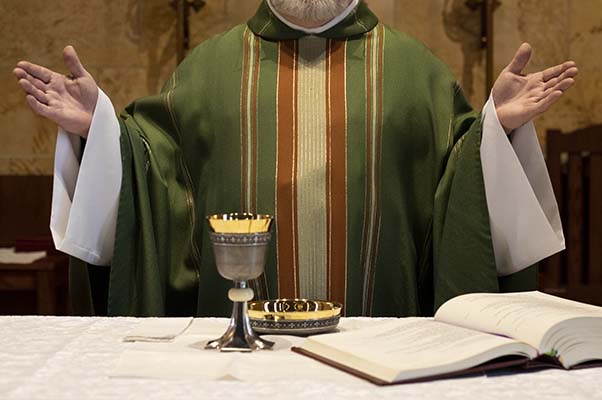Fruit of the Vine
Br. Francis Wagner, OSB
Thursday, August 18, 2022

During the Liturgy of the Eucharist, at the Presentation and Preparation of the Gifts, the priest holds the chalice filled with wine and praises God with these words: "Blessed are you, Lord God of all creation, for through your goodness we have received the wine we offer you: fruit of the vine and work of human hands, it will become our spiritual drink." And the People of God respond, "Blessed be God, forever."
Since the priest is acting during the Mass in persona Christi, or in the person of Christ, this is a profound mystery to consider. It is together with Christ that we offer the gifts we have received from God and praise the Father. It is a participation in the very life, death and resurrection of Christ, so that we may go out and offerour very lives - the work of human hands. But at the same time, all we do, say, or think in the name of Christ is God-given grace, the fruit of the vine. All that is good which we offer to God was first given to us. Through Christ, we bear fruit for the Kingdom of God as stewards of the divine mysteries.
This theme is present throughout Scripture, but perhaps nowhere more explicitly than in John 15, when Jesus tells his disciples on the night he was betrayed: "I am the true vine, and my Father is the vinegrower... Abide in me as I abide in you. Just as the branch cannot bear fruit by itself as it abides in the vine, neither can you unless you abide in me. I am the vine, you are the branches. Those who abide in me and I in them bear much fruit, because apart from me you can do nothing" (John 15:1, 4-5).
The point is clear: we must remain connected to, or tapped into, the life-giving force (the "sap," as it were) of Christ the True Vine, to bear an abundant harvest of fruit - our good works - in building up the Kingdom of God, God's vineyard which he gives to us.
This vineyard image is common throughout scripture (see, for example, Isiah 5:1-7). In Matthew's Gospel (21:33-43), Jesus' parable of the landowner's vineyard and his wicked tenants serves as an allegory with several purposes: to confront religious leaders of the time for being unfaithful stewards of God's grace, to point out the numerous prophetic voices they have ignored, to predict his own death as the fulfillment of those prophetic voices, and to fortell the fruition of the Church. You and I are the "other tenants" to whom the vineyard has now been leased by the owner of the vineyard, God the Father.
But we are not alone. The vine we tend as stewards also tends us. Christ joins us in the vineyard of the Church as the True Vine, giving us life so that we may, in turn, with him produces abundant fruit praise of the Father - the fruit of the vine and work of human hands. In short, it is Christ who gives life to the Church.
It is not a human institution, but was born on the cross, when water and blood - the very life of Jesus - poured out from his pierced side. Christ is our sap. And if we remain tapped into him through the Eucharist, in common with worship, in prayer and Scripture, in the sacraments and tradition of the Church, we will bear his fruit as faithful tenants of the vineyard, saying with him, "Blessed be God forever."
The key to all this is expressed by St. Paul. "Do not worry about anything," he urges, "but in everything by prayer and supplication with thanksgiving let your requests be made known to God. And the peace of God, which surpasses all understanding, will guard your hearts and your minds in Christ Jesus" (Philippians 4:6-7).
Like the religious leaders in Jesus' day, we all have a tendency to beat down or "kill" the prophetic voices within and around us. It happens in numerous ways. Ignoring someone who clearly needs our help because we'd rather not bother, or because the person is someone we don't particularly like. Becoming so immersed in our outward activities that we squelch God's tiny whispering sound deep within and lose focus on what's really important in life. Worrying to the point of despair rather than trusting in God's providential care. There are myriad ways of disposing of prophetic vocies sent by God to help us with care of the vineyard, his Church.
What St. Paul is saying is that thorugh prayer and praise, we remain connected to Christ the True Vine. We participate in the mystery we contemplate. We listen to the prophetic voice of God deep within and around us. Our hearts and minds find the peace that the world cannot give. We bear abundant fruit - fruit of the vine and work of human hands - for the world to feast on and (hopefully) find peace as well.
But without Christ, we can do nothing. Before we can harvest the grapes, savor the wine, and pour it into the hearts of others, we must let the True Vine grow within us, give us life, and produce his abundant fruit.
Then, with the psalmist, we can say:
What shall I return to the Lord for all his bounty to me? I will lift up the cup of salvation and call on the name of the Lord. - Psalm 116:12-13